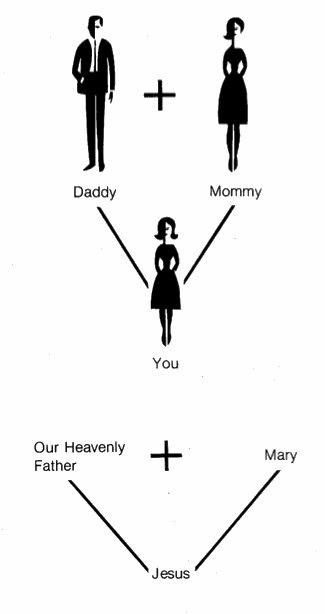podcast 70 – The one God and his Son according to John
In my view, the fourth has been the most misunderstood gospel.
In my view, the fourth has been the most misunderstood gospel.
At the Research on Religion podcast, here is a new, wide-ranging, informative interview with analytic theologian Dr. Oliver Crisp of Fuller Seminary. He gives a sort of overview of the Magisterial (as opposed to the Radical) Reformation, and in the latter part of the interview he talks about his new book Deviant Calvinism (kindle). He also discusses the recent revival of Reformed Theology outside of traditional… Read More »Dr. Oliver Crisp on Reformed history and theology

Last time, I explained that Athanasius thinks human fathers procreate sons by giving a part of their substance to the mother, and that bit of substance then becomes an ingredient in the zygote, and the zygote inherits its human nature from that ingredient.
Athanasius thinks this basic model applies to God too, though he is careful to make an important qualification: human fathers beget sons by giving up a part of their substance, but God the Father gives his whole self to his Son, not a part.
Read More »Arius and Athanasius, part 8 – Athanasius on begetting the Son (JT)

Last time, I explained that Arius believes there can only be one unproduced producer, and that’s the Father. The Son, by consequence, is produced, but there’s nothing controversial about saying that. Arius gets controversial when he tries to explain how the Son is produced. As Arius sees it, if the Father produced the Son with any ‘pre-existing ingredients’, he’d either have to use created ingredients, or he’d have to use some ingredient taken from within himself (those are the only two options). But Arius thinks neither of these are open to the Father.
Read More »Arius and Athanasius, part 6 – Arius on the Son’s creation (JT)
Alex @ Alexander Pruss’s Blog urges that even non-social trinitarians can make a priori arguments for their trinitarian theology based on the concept of perfection. I don’t think these sorts of arguments work, as I explain in a comment there, but check it out – Alex is always worth a read, and maybe I’m all wet.
Did fourth century Christians come to a consensus about “the doctrine of the Trinity”?
Is there a plausible and biblical “doctrine of the Trinity”?
Sacrifice to the gods, or die. What would you do?
Many Christians in the 2nd to the 4th centuries, and many since, have read the famous opening of the gospel according to John like this: In the beginning [i.e. at the Genesis creation, but not necessarily before] was the Word [i.e. the pre-human Jesus], and the Word was with God [i.e. the Father], and the Word was divine.
Dr. Lee Irons on his contribution to the new book The Son: Three Views of the Identity of Jesus, interview by Dr. Dale Tuggy for episode 117 of the trinities podcast.
This week I start with a long and insightful listener comment. Among other things, he asks how one’s theology as unitarian or trinitarian affect one’s discipleship, or how one follows Jesus as Lord. I give a short answer from my own experience here, confessing how my own confusions hindered my spiritual life. The listener also asks: doesn’t Locke require too little? In particular, mustn’t a Christian also, minimally,… Read More »podcast 53 – John Locke’s The Reasonableness of Christianity, Part 2
What are the essential teachings which one must accept to be a Christian?
With this episode we continue our series on the 4th-century creed-producing councils of catholic bishops.
Here’s part of a conversation I had recently with a guy in a Facebook group who when it comes to theology consumes almost only evangelical apologetics sources. I’m going to call him “Tim” here. The conversation illustrates a blind spot that I often run into, a blind spot which results from people who study apologetics being insufficiently trained in logic. All the non-theological points I… Read More »the apologetics blind-spot on numerical identity
Dr. Keith Ward is a prolific and influential theologian, philosopher, and scholar of religions. He’s also an Anglican priest. In this first of two interviews on his 2015 book Christ and the Cosmos: A Reformulation of Trinitarian Doctrine, we discuss his christology, how to understand what is unique about the man Jesus.
Here are three more excellent new videos by Notre Dame’s Center for Philosophy of Religion! (subscribe here): Dr. Carl Mosser on deification. What, you as, is that? And isn’t that just a weird Orthodox idea? OK… but what does it mean? And doesn’t this sort of talk raise a bunch of philosophical issues? But seriously… where is this in the Bible? Want more in depth… Read More »Dr. Carl Mosser on deification in theology and in the Bible
If we accept that God is the greatest being there could possibly be, this will guide our theorizing about God. As Dr. Leftow explains, the method can be uncertain and hazardous. Still, it seems an indispensable tool in Christian thinking about God.
Here. It’s an excellent, substantial discussion, posted in December 2014. If you don’t know who Dr. Rea is, he’s a leading Christian philosopher, specializing in metaphysics, and co-coiner of the useful term “analytic theology.” Here’s a rough guide to the interview, in case you want to skip around, or review after the fact, with a few sparse comments in italics. 1-12:20 Randal reads quotes about how difficult a… Read More »Dr. Randal Rauser interviews Dr. Michael C. Rea on the Trinity
Does the Bible ever speak of redeemed humans as “gods”? Many Jews and Christians have thought so. In this episode Dr. Carl Mosser takes us on a journey through this theme in the Bible, including Psalm 82, the New Testament epistles, and the book of Genesis. You’ll have listen to see why I chose a picture of Joseph in his career as the Pharaoh’s right… Read More »podcast 60 – Dr. Carl Mosser on deification in the Bible
In this episode Sean and I continue our discussion of “the Holy Spirit” in the New Testament, covering such topics as how “the Spirit” relates to worship and prayer in the New Testament, the eternal trinitarian “dance” discussed in recent trinitarian literature, the threefold baptismal formula, and “blasphemy against the Holy Spirit.” Some relevant links: Holmes’s edition of the Apostolic Fathers Ehrman’s Lost Scriptures (with… Read More »podcast 26 – Pastor Sean Finnegan on “the Holy Spirit” – Part 2